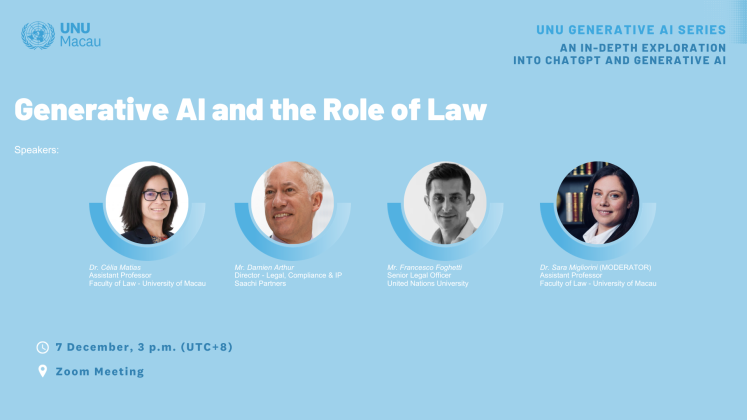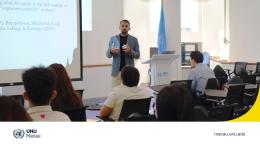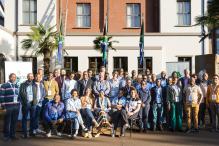Abstract
Generative AI has had and continues to have ample repercussions across many different sectors of society and, consequently, many different subfields of law. In this webinar, we will explore a number of risks and challenges raised by Generative AI technology, and the role of law in addressing them, steering the technology towards the common good.
At the moment of writing, policy makers and regulators at the national and supranational level are debating if and how they should regulate generative AI. A first issue that has arisen in the policy debate about the best way to regulate generative AI is whether new regulation is necessary at all, and if new regulation could stymie innovation, putting the national economy at a disadvantage as compared to other countries that may let the new technology run free of regulation.
However, from a legal point of view, it appears that this should not be the first question that policy should struggle with. On the contrary, there should be first a reflection on what existing laws that are enforceable at present are relevant and applicable to generative AI. As aptly put recently by the Chair of the US Federal Trade Commission, “Claims of innovation must not be cover for lawbreaking. There is no AI exemption to the laws on the books”.
Along this line, in many jurisdictions, there is a significant body of enforceable legal rules that should be relevant to the deployment of Generative AI. Under this perspective, these amazingly disruptive tools do not raise disruptive legal questions, but rather old ones.
After having surveyed the existing laws that constrain AI, there will remain other important, and truly innovative questions that will not be well apprehended by existing laws. In these respects, the issue will indeed be whether new rules are needed, and what form such rules should take: top-down regulation, judge-made law or various forms of soft laws and collaborative rules, and whether legislative action is needed or even possible at the national, regional or international level.
Speakers
Dr. Célia Matias
Assistant Professor, Faculty of Law - University of Macau
Dr. Célia Matias is an Assistant Professor and the Programme Coordinator of Master of Law (Portuguese Language) at Faculty of Law – University of Macau. She holds a PhD in Law from the University of Hong Kong (2021), and her research interests include Law and Technology, Privacy and Data Protection Law, Intellectual Property Law, Legal Theory and Law and Society. Dr. Célia Matias is a qualified lawyer in Portugal and in the Macau SAR, with professional experience in corporate and financial transactions, intellectual property advice and litigation, data protection and other areas of compliance.
Mr. Damien Arthur
Director – Legal, Compliance & IP, Saachi Partners
A legal recruiter and a qualified solicitor in England and Wales with 20 years of experience across different industries, Mr. Damien Arthur is Director – Legal, Compliance & IP at Saachi Parners and specializes in sourcing talent for both foreign and domestic firms in Tokyo. Beyond his expertise as a legal recruiter, Mr. Damien Arthur’s proficiency extends to compliance recruitment. He has successfully executed numerous retained searches for asset managers and investment firms, with a focus on identifying compliance officers with the expertise to meet the highest industry standards and government regulations.
Mr. Francesco Foghetti
Senior Legal Officer, United Nations University
Mr. Francesco Foghetti is Senior Legal Officer at the United Nations University (UNU) and Associate Secretary of the UNU Council. He provides advice to the UNU system on a range of legal issues. Prior to joining UNU in 2012, Mr. Francesco Foghetti worked in the private sector as in-house counsel. He has also provided training in various fields of law for professional qualifications. He has completed the Certificate Programme in Public International Law from Temple University Law School, Japan Campus. Mr. Francesco Foghetti was admitted to the Italian Law Bar in 2004, after having earned his Law Degree from the University of Urbino, Italy.
Dr. Sara Migliorini (Moderator)
Assistant Professor, Faculty of Law – University of Macau
Dr. Sara Migliorini is an Assistant Professor at the Faculty of Law – University of Macau. She is a Doctor of Laws, from the European University Institute (EUI), Florence, and her research interests include the field of Artificial Intelligence and Big Data, as well as the area of International Litigation and Arbitration. In the past, Dr. Sara Migliorini has worked in research at the British Institute of International and Comparative Law, as well as at the University of Lausanne. She has also experience working for an international law firm. Dr. Sara Migliorini has earned several grants and awards throughout her career.




